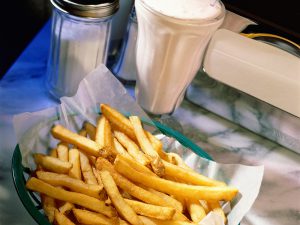We all know that eating greasy, high-fat foods, like double bacon burgers with fries and a milkshake, isn’t good for us and can lead to health problems, like fatty liver disease.
Yet, for many of us, the idea of cutting these foods out of our diets completely and eating healthy seven days a week is just too big of a challenge to tackle.
But, what if you could enjoy them on occasion and still remain healthy, stave off liver disease and even avoid diabetes?
Well according to scientists, there’s a way…
And, it all starts with a simple cooking oil you probably already have in your kitchen pantry right now…
Ancient oil protects against fatty foods
You see, the problem with those high-fat foods stems from their tendency to cause your liver to accumulate more fat cells, including triglycerides (the same thing your doctor is looking at when he checks your cholesterol), and pump more of them into your bloodstream.
When these triglycerides build up bad things happen, and you can end up with what’s known as non-alcoholic fatty liver disease, or NAFLD it’s a build-up of extra fat in your liver cells that’s not caused by alcohol.
And, while it’s normal for your liver to contain some fat if more than 5 percent to 10 percent of your liver’s weight is fat, then you have a fatty liver.
NAFLD tends to develop in people who are overweight or obese or have diabetes or high cholesterol. Even rapid weight loss and poor eating habits can cause NAFLD. However, some people develop NAFLD even if they don’t have any risk factors and the disease affects up to 25 percent of people in the U.S.
Symptoms of a fatty liver include fatigue, weakness, weight loss, loss of appetite, nausea, abdominal pain, spider-like blood vessels, yellowing of the skin and eyes (jaundice), itching, fluid build-up and swelling of the legs and stomach and confusion.
You may even have fatty liver disease and not know it, since some people never have symptoms.
But, once you have it, NAFLD can cause your liver to swell and lead to scarring, called cirrhosis.
The Mediterranean answer to a fatty liver
You don’t have to end up with a swollen, sluggish liver just because you occasionally enjoy high-fat foods — as long as you incorporate olive oil into your daily diet.
You see, scientists decided to test the power of extra-virgin olive oil to combat or even reverse the effects of a high-fat diet, and the results were impressive.
The researchers found that hydroxytyrosol, a polyphenol found in extra-virgin olive oil, which is known to have antioxidant properties, actually protects your liver.
Adding hydroxytyrosol to a high-fat diet, reversed the effects of poor eating, and reduced the signs of fatty liver disease, as wells as the negative effects seen in other organs, like the heart and brain.
And as a bonus, the hydroxytyrosol even prevented insulin resistance, the first step toward diabetes.
This could be the reason why research has shown that the traditional Mediterranean diet, including olive oil, reduces the risk of heart disease and the “bad” cholesterol that can build up deposits in your arteries.
In fact, a meta-analysis of more than 1.5 million healthy adults demonstrated that following a Mediterranean diet was associated with a reduced risk of cardiovascular mortality, as well as overall mortality.
Now, this doesn’t mean you should give up eating healthy. If you crave those high-fat foods that you just know aren’t good for you, make sure you’re getting a regular daily dose of extra-virgin olive oil — at least one to three tablespoons — to combat the effects of a high-fat diet the Mediterranean way.
Editor’s Note: You’re invited to join a tiny handful of Americans who enjoy rare, fresh-pressed olive oil all year long. Take my word for it, there’s a difference in taste, quality and benefit! Click here to learn more…
Sources:
NAFLD Non-Alcoholic Fatty Liver Disease — American Liver Foundation
Olive oil consumption and non-alcoholic fatty liver disease — World Journal of Gastroenterology
Diet could REVERSE negative effects of high-fat food — and CURE liver disease — Daily Express
Mediterranean diet: A heart-healthy eating plan — Mayo Clinic
Read full article here




